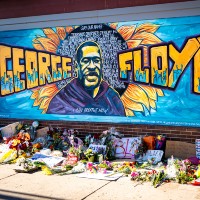 Over 200 UK advertising leaders and executives have signed an open letter calling for “action not words” to tackle racism within the industry. The letter comes in response to the tragic death of George Floyd, a black American man who died after a Minneapolis police officer kneeled on his neck for over eight minutes, which has sparked widespread protests across the US, as well as the UK. The letter outlines ten specific ways for the industry to hold itself accountable for making progress on racial equality.
Over 200 UK advertising leaders and executives have signed an open letter calling for “action not words” to tackle racism within the industry. The letter comes in response to the tragic death of George Floyd, a black American man who died after a Minneapolis police officer kneeled on his neck for over eight minutes, which has sparked widespread protests across the US, as well as the UK. The letter outlines ten specific ways for the industry to hold itself accountable for making progress on racial equality.
The open letter states that as a creative sector, the advertising industry “has a profound impact on culture,” but says that within the industry, systematic inequality is still prevalent. According to census data released in April by the Institute of Practitioners in Advertising (IPA), the industry has taken a step backwards in diversifying the ethnic make-up of leadership. In 2019, just 4.7 percent of executives were recorded as BAME (black, asian, and minority ethnic), compared to 5.5 percent in 2018.
The letter also states that progress needs to be made on creating and maintaining inclusive cultures which are sensitive to inequity and the pain of racism. “We ask people across the industry to be conscious of the trauma that many black colleagues and their peers may be experiencing, as they process the news and fallout of the killing of George Floyd and other acts of violence,” the letter says.
Those in positions of influence are also asked to use the cultural power of advertising to “bring authentic prominence to the crisis of racial injustice”.
To help spur action, the letter outlines ten specific actions which industry leaders can take:
- Empower leaders and boards to drive representation and inclusivity by being a core part of the leadership team’s strategic priorities with clear KPIs, actions and objectives, transparently communicated. Deeply understand and monitor the data of your company and understand what goes on within it.
- Senior leaders must step up, speak out and take action. All leaders need to acknowledge the escalating racism of the last few months in town halls and company wide gatherings, in order to open this conversation in their organisations. Leaders should use their company channels to share links, information, resources and black-driven research.
- Enable employees to understand their own privileges (and what white privilege means) and their biases to help them become accountable allies and activists.
- Call out racism whenever it is encountered. Everyone is responsible for this, from the CEO to all staff across your organisation. Implement an incident management plan or refer to your equality policy for guidance. Building trust creates solidarity in the workforce and provides a psychologically safe space to work. This can allow for issues such as micro-aggressions (subtle acts of discrimination) to be addressed.
- Create safe and inclusive spaces to have open and frank conversations about racism with everyone in attendance. Use these to promote active advocacy and open dialogue for both black talent and allies.
- Use existing employee resource groups, such as WPP’s Roots, Publicis Group’s Embrace or for those without networks, assemble ad-hoc forums now such as Publicis Sapient’s ‘Brave Spaces’.
- ‘Check the make-up of your own circle and seek out different points of view,’ as recommended by WPP U.K. Country Manager & CEO GroupM UK, Karen Blackett OBE.
- Check-in with black employees – particularly if you are a leader or line manager.
- Represent at every level and most importantly, on your leadership team: welcome, promote, champion, and celebrate black employees. Commit to amplifying and elevating black talent, working with black-owned businesses and supply chains.
- Examine your preferred supplier’s list. Ensure your advertising isn’t funding white supremacy or racist content.
Heide Gardner, Interpublic Group’s SVP and chief diversity and inclusion officer, said that the real test is creating cultures within the industry where “we support each other when our experiences, needs, feelings, and even new ideas are different from the majority of our colleagues, and especially when we differ from those who have power over our careers”.
“Only then will we achieve cultures of genuine belonging where people of colour don’t have to endure the daily calculus of how or if to disclose their feelings, respond to situations or feel implicitly responsible for the comfort of others over their own,” said Gardner.




